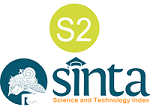Ekspansi termal linier dan residu malam inlei gigi dengan komponen parafin Indonesia
Dyah Irnawati(1*), Widjijono Widjijono(2), Harsini Harsini(3)
(1) Universitas Gadjah Mada
(2) Universitas Gadjah Mada
(3) Universitas Gadjah Mada
(*) Corresponding Author
Abstract
Inlay wax is used for pattern of metallic inlays, crowns, and fixed partial dentures. Inlay wax must have a linear thermal expansion (LTE) and a residue that comply the standards. Inlay wax contains paraffin, carnauba, and beeswax. Paraffin and beeswax are produced in Indonesia. This study aims to examine the effect of the inlay wax compositions with paraffin and beeswax Indonesia on the LTE and residue properties. The research materials are paraffin (Pertamina, Balikpapan), beeswax (SEA, Yogyakarta), carnauba wax (Brataco Chemicals, Yogyakarta), and inlay wax (GC, Japan). Five inlay wax compositions are made with a ratio of paraffin, carnauba, and beeswax 60: 35: 5 (K-60), 65: 30: 5 (K-65), 70: 25: 5 (K-70), 75:20 : 5 (K-75), and 80: 15: 5 (K-80) (% w/w). The waxes were melted at 75 ± 5 oC then moulded for the TLE (267x6.35 x6.35 mm) and the residue (1 g) test specimens (n=4). The LTE and residue specimens were also made of paraffin, carnauba wax, beeswax, and commercial wax (n = 4). The LTE and residue tests were carried out based on ANSI/ADA specification No.4. Data were statistically analyzed by analysis of variance and LSD (α = 0.05). Anava test results showed that composition and temperature had a significant effect on LTE (p <0.05) and composition had a significant effect on residues (p <0.05). The LSD test results showed a significant difference in LTE of the K-75 group with other groups and the residues of the K-75 group and K-80 group with other groups (p <0.05). Inlay wax compositions with high paraffin concentrations have high LTE and residue. The value of LTE and residue of inlay wax with paraffin and beeswax from Indonesia are in accordance with the ANSI/ADA specification no. 4.
Keywords
Full Text:
PDFReferences
American National Standard /American Dental Association / ANSI/ADA. 2000. ANSI/ADA specification No.4-1983 Dental inlay casting wax. Council on Science Affairs ADA. Chicago. 1-10
Anonim. 2017. Paraffin wax, carnauba wax, and beeswax properties. https://www.chemicalbook.com . April 2019 (15.20).
Anusavice, K.J. 2003. Phillips’ Science of Dental Materials. 11st Ed. Elsevier Science. St. Louis. p 283-93.
Craig, R.G., J.M. Powers, dan J.C. Wataha. 2004. Dental Materials Properties and Manipulation. 7th Ed. Mosby Inc. St. Louis. p 221-230.
Helmenstine, A.M. 2018. Find out What Happens to Candle Wax When a Candle Burns. https://www.thoughtco.com/where-does-candle-wax-go-607886. 21 Mei 2019 (13.21).
Irnawati. D. 2007. Pengaruh rasio malam paraffin dengan malam carnauba terhadap terhadap titik leleh dan kekerasan malam ukir. Laporan Penelitian. Fakultas Kedokteran Gigi Universitas Gadjah Mada. Yogyakarta.
Irnawati, D., Widjijono, dan P. Agustiono. 2008. Pengaruh komposisi malam ukir terhadap titik leleh dan kekerasan. Maj. Ilmiah KG FKG Trisakti. 03:123-8.
McCabe, J.F., dan A.W.G. Walls. 2008. Applied Dental Materials. 9th Ed. Blackwell Science Ltd. Cambridge. p 40-5.
McMillan, L.C. dan B.W. Darvell. 2000. Rheology of dental waxes. Dental Materials 16: 337-350. Powers, J.M., dan R.L. Sakaguchi. 2006. Craig’s Restorative Dental Materials. 12th Ed.Mosby Elsevier. St.Louis. p.337-57.
Article Metrics
Refbacks
- There are currently no refbacks.
Copyright (c) 2020 Dyah Irnawati, Widjijono Widjijono, Harsini Harsini

This work is licensed under a Creative Commons Attribution-ShareAlike 4.0 International License.
Submit an Article Tracking Your Submission
Editorial Policies Publishing System Copyright Notice Site Map Journal History Visitor Statistics Abstracting & Indexing










